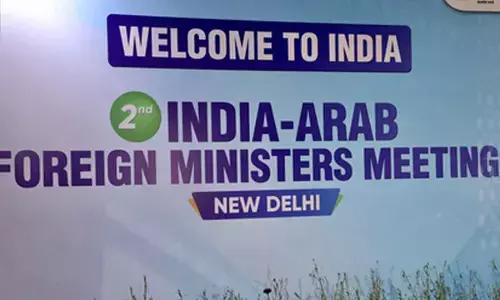States passing laws contrary to Central laws is contemptuous!

Of late, a new trend of passing laws by the State Assemblies contrary to those passed by Parliament has gained currency. For example, Opposition-ruled States like West Bengal, Telangana, and others had passed legislations going against the Citizenship Amendment Act (CAA) and the National Register of Citizens (NRC), which were already passed by Parliament.
Hyderabad: Of late, a new trend of passing laws by the State Assemblies contrary to those passed by Parliament has gained currency. For example, Opposition-ruled States like West Bengal, Telangana, and others had passed legislations going against the Citizenship Amendment Act (CAA) and the National Register of Citizens (NRC), which were already passed by Parliament.
Similarly, some States have also initiated the process of passing Bills opposing the three laws, namely Bharatiya Nyaya Sanhita (BNS), Bharatiya Nagrik Suraksha Sanhita (BNSS), and Bharatiya Sakshya Adhiniyam (BSA), which have already been enacted as laws by Parliament.
Indeed, it is strange that when the national Panchayat called Parliament, representing all political parties, has already passed a law, how can a State pass a law opposing the law passed by Parliament. In simple terms, if a political party is not able to stall a Bill in Parliament, then it will do so in the State ruled by it. The Constitution and the laws made thereunder do not permit such a course.
The jurisprudence permits the States to enact laws on subjects exclusively earmarked for them as well as the subjects stated in the concurrent list. Further, it is a settled law that, in case of a dispute as to which provision shall prevail over the other in the case of the concurrent list, the answer is that the law passed by Parliament shall prevail over the law enacted by a State. It is also laid down that neither the Union nor a State can enact a law that is not in sync with the Constitution.
In other words, the laws enacted by a State in contravention or derogation to the laws passed by Parliament ipso facto become null and void. Parliament Suo Motu takes cognisance of such an act of a legislature, initiates contempt of Parliament proceedings against the concerned State authorities, and appropriately punishes them. Even a High Court or the Supreme Court can either on an application filed by a person or an entity, or Suo Motu, take cognisance of the matter and punish the concerned authorities besides declaring the law passed by the State as ultra vires and unconstitutional.
Obviously, there is no ambiguity in this. And in order to teach a fitting lesson to the unbridled State rulers, it is necessary to counter them with the same zeal and commitment as they show while passing laws against Centrally-enacted ones.
Authorised signatory, not a drawer of cheque: SC
An authorised signatory of a company who signs a cheque is not a drawer of the cheque and therefore, not liable to pay interim payment to the complaint under Section 143 A of the Negotiable Instruments Act, held the Supreme Court in a recent judgement.
Gujarat HC CJ expresses concern over Tarikh Pe Tarikh
Chief Justice Sunita Agrawal of the Gujarat High Court on July 27 expressed concern over the tendency of delaying court proceedings, popularly known as Tarikh Pe Tarikh.
The CJ, who inaugurated the website of the Gujarat Bar Council and Gujarat Law Herald, appealed to the legal fraternity to shun the culture of taking frequent adjournments in cases. It helps no body, she added. With the launch of the website, lawyers throughout the State will be benefited because they can resolve their issues relating to practice online without having to visit the office of the Bar Council, she added.
TN Consumer Commission grants Rs 35K compensation
Pickle, the spicy, tangy accompaniment to a meal, especially south Indian, found favour from the Tamil Nadu State Consumer Commission, which slapped a compensation of Rs 35,000 on a hotel for its negligence in not supplying pickle along with 25 meals ordered by the complainant.
The complainant, C Arokiasamy, had ordered 25 meal parcels on the occasion of the first death anniversary of his mother. Pickles were also to be part of the meals. He made the payment of Rs 2,000, for which, except for a small chit, no proper receipt was given. On opening the parcel, it was found that pickle was missing. However, the meals were served to guests without pickles. The complainant alleged that this amounts to a deficiency of service and mental cruelty. Accepting the contention of the complainant, the commission found Balumurugan Hotel guilty and awarded the complainant Rs 35,000 towards compensation, besides Rs 5,000 towards litigation expenses.
Kerala HC quashes POCSO and rape case on humanitarian grounds
Justice Badhruddin of the Kerala High Court recently quashed a 2021 case of POCSO and rape case on humanitarian grounds. The victim submitted that, after the incident, she had married the accused and had two kids. She said she was happily living with the accused.
The Court opined that applying the rigours of the law and punishing the accused would only shatter the family. Hence, making a deviation, the case was quashed.














